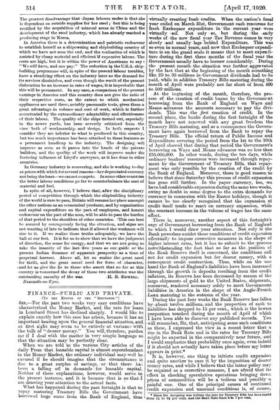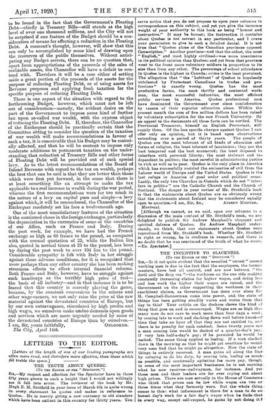FINANCE—PUBLIC AND - PRIV - AVE.
. [To TEE EDITOR or rue " SPECTATOR 2,1 San,-For the. past two weeks very easy conditions have characterized the Money Market, arid. the rate for loans in Lombard, Street has 'declined 'sharply. I would, like to explain exactly how this ease has arisen, because it has an important -bearing upon' the _general financial situation, and, at - first sight may seem . to be entirely at variance.with the talk Of "dearer. money.' You vrill;therefore; pardon me if I deal with the matter in very simple language so; that the situation maybe perfectly clear.
When we -are told in • the -various- Clity,artieles of the daily-Press that loanable capital -is almostsuperabundant in the Money Market, the ordinary' individual may-well be excused if he Should imagine that the circumstance is due to a great surplus of savings, or that there has been a falling off in demands for loanable - capital. Neither of these explanations, however, would. serves in the present instance, and -it is because that is,so _that I am drawing your attention to the aotual -facts.
-What has happened :during the past fortnight is that to repay maturing Treasury Bills the Government : have borrowed, huge sums from the • Bank of England, thus -virtually creating fresh credits. When the nation's fiscal -year -elided on March 31st, Government cash resources for fresh Exchequer expenditure in ' the current year were -virtually -nil. 'Not only so, but during the early -weeks of the new-fiscal year -Tax Revenue eomes in very slowly and usually lags -behind •Expenditure. This was so even in normal years,tand now that 'Exchequer expendi- ture is•on the, grand male it means that to meet expendi- ture during the first three -months of the fiscal year the )Government usually have to -borrow considerably. the present. month; the-situation was further-aggrav by the fact that at the beginning of the month something like 25=4,o,30 millinos in 'Government dividends-bad-to-be paid,- while in addition Treasury- Bills maturing during the • month of -April -were. probably_ not .far short of from 400 :to -500-millions.
At - the beginning of the - month, therefore, the pro- cess -of the creation of_ credit began by the - Government -borrowing from the _Bank • of Eugland on 'Ways -and -Means; advanees the amounts necessary- to, pay the divi- ,dpn(1,4. This was the first creation of credit. In the second_place, -the banks -during -the first- fortnight of the -month have not -renewed With .any great -freedom the -Treasury Bills maturing, and as a consequence-the Govern- ment have again borrowed from the Bank to repay'the .Treasury Bills. The official return of Public Income and :Expenditure covering the period from the "1st to the' loth of April showed that 'during that peritid the Government's borrowing on Ways and Means advances was no less' than £55,000,000. In other words, during the ten days, while ordinary bankers' resources were increased through repay- ment by • the Government 'of 'Treasury Bills, that repay- ment -was -only possible by the creation of the 'credit :by the Bank of 'England. Moreover, there is good- reason to believe that since--Sstarday -this 'process Of credit expansion -has gone still further. the paper -currency, too, we havabad considerable expansionduring the same two weeks, awing no doubt in--some 'degree to .the extra demands for currencyin connexion with the: aster holidays, though it cannot ' be too. clearly -recognized that the expansion of credit itself tends to- react on currency expansion, while the constant increasein the-volume of wages has-the-same effect.
.There is, moreover, another aspect of this. fortnight's orgy of -Government :borrowing from the. Rank of FaTzland to 'which. I would draw your attention. Not only is the Bank powerlesstamidst these conditions of credit expansion effectually to impose. _corrective measures in the shape. of higher interest rates, but it hes to submit to -the- process notwithstanding ,the lact that so far as the , position of the Bank . Reserve itself' is concerned, - the conditions call not.-for credit -expansion but for ,dearer money, with a consequent- credit contraction. -Thus, while .on the 'one hand the- Bank cf. England's liabilities...have _been. increased through the . growth in deposits resulting from :the credit inflation, its Reserve ,has been decreased .tby reason of the lava-shipments of _gold to.-the United _States,: shipments, _moreover, rendered -necessary solely to -meet _Government liabilities in America in _ the_ shape of the -Angl&-Frenh ,Losn-matuzing, in -the.. autumn of the year. -During the past four weeks the Bank Reserve' has.fallen by-.about twelve .millions, and the proportion .of oath. to liabilities_has dropped to t15 per cent., -which is the lowest proportion touched during the month of -April of whiCh I have been able to discover any published records. You will remember, Sir, that, anticipating some conditions as these,: I expressed the view -in. a recent letter that -a rise in the Bank Rate and in the rates for -Treasury Bills might be . expected in the .comparatively near future,' and I would-emphasize that probability once again; even indeed if it should not actually have taken place before-ray letter appears.in print:* It is, however, one thing to initiate credit expansion and quite another to cure it by the imposition of dearer money rates, and while I believe thatthe latter-policy may be required as a corrective- measure, I am afraid that its effect in checking speculative operations bringing -down prices of commodities will be -a tedious and possibly painful one. One of the principal causes of ‘continued credit expansion and -unsound conditions is, of •course, • dime the foregoing was written the rate for Treaaory Bills has beenraistd from 51 to 61 per cent. andthe Bank Bate -from 6 to 7 per mint. to be found in the fact that the Government's Floating Debt—chiefly in Treasury Bills--still stands at the high level of over one • thousand millions, and the City will not be surprised if one feature of the Budget should be a con- sideration of means for effecting .a reduction lathe Floating Debt. A moment's thought, however, will show that this can only be accomplished by some kind of drawing upon the resources of the public themselves. Without antici- pating any Budget secrets, there can be no question that, apart from appropriations of the proceeds of the sales of realizable assets, the Chancellor will have a deficit to con- tend with. Therefore it will be a case either of setting aside a great portion of the proceeds of the assets for the purpose of reducing Floating Debt, or of using assets for Revenue purposes and applying fresh taxation for the specific purpose of reducing Floating Debt.
There is one aspect of the situation with regard to the forthcoming Budget, however, which must not be left out of consideration—namely, the evident desire on the part of the Government to impose some kind of further tax upon so-called war wealth, with the express object of reducing the Floating Debt. If, therefore, the Chancellor of the Exchequer should be practically certain that the Committee sitting to consider the question of the taxation of war wealth will make recommendations in' favour of such a tax, it is conceivable that his Budget may be materi- ally affected, and that he will be content to impose only moderate additions to permanent taxation on the under- standing.that reduction of Treasury Bills and other forms of Floating Debt will be provided out of such special levy. As to the latest recommendations of the Board of Inland Revenue with regard to the tax on wealth, perhaps the best that can be said is that they are better than those which were. first put forward, in the sense that is at least something like an attempt to make the tax applicable to a real increase in wealth` during the war period; whereas the first recommendations were far too much in the nature of .a levy on capital pure and simple—a levy against which, it will be remembered, the Chancellor of the, Exchequer resolutely set his face a twelvemonth ago.
One of the most unsatisfactory features of the situation is the continued chaos in the foreign exchanges, particularly the• depreciation in the currencies of some of the countries of our Allies, such as Prance and Italy. During the past week, for example, we have had the French exchange as high as 68 francs to the pound, as compared with the normal quotation of 25, while the Italian lira also, quoted in normal times at 25 to the pound, has been up during the past week to over 104 lira to the pound.. Considerable sympathy is felt with Italy in, her struggle against these adverse conditions,- for it is recognized that more perhaps than any other country she has been making strenuous efforts to effect, internal financial reforms. Both France and Italy, however, have to struggle against such handicaps as the terribly high price of fuel— the basis of all industry—and in that instance it is to be feared that this country is scarcely playing the game, because, by the constant concessions to the miners and other wage-earners, we not only raise the price of the raw material against the devastated countries of Europe, but by our own extravagance, stimulated by high profits and high wages, we ourselves make undue demands upon goods and services which are more urgently needed by some of the devastated countries of Europe than by ourselves.—



































 Previous page
Previous page